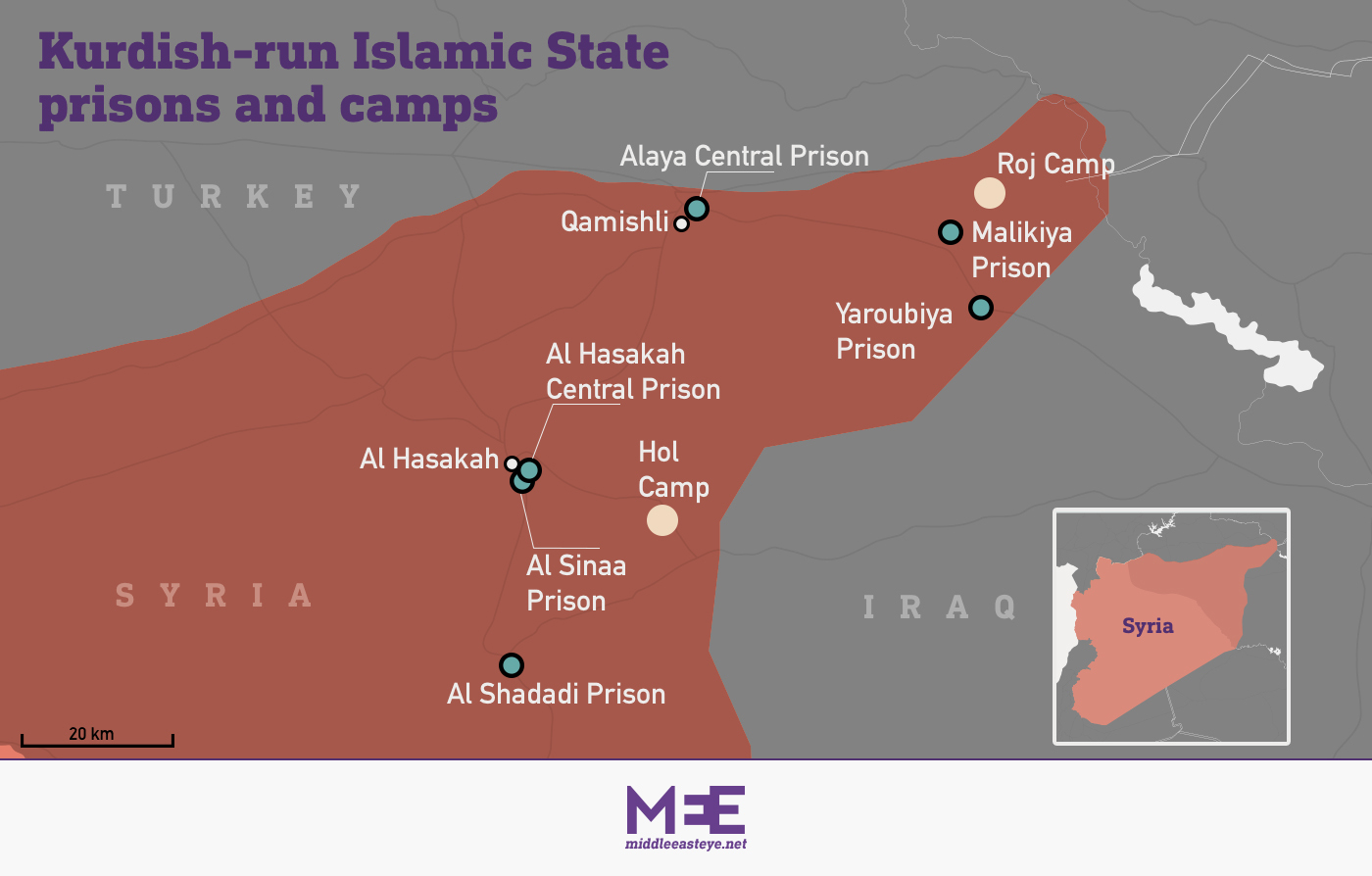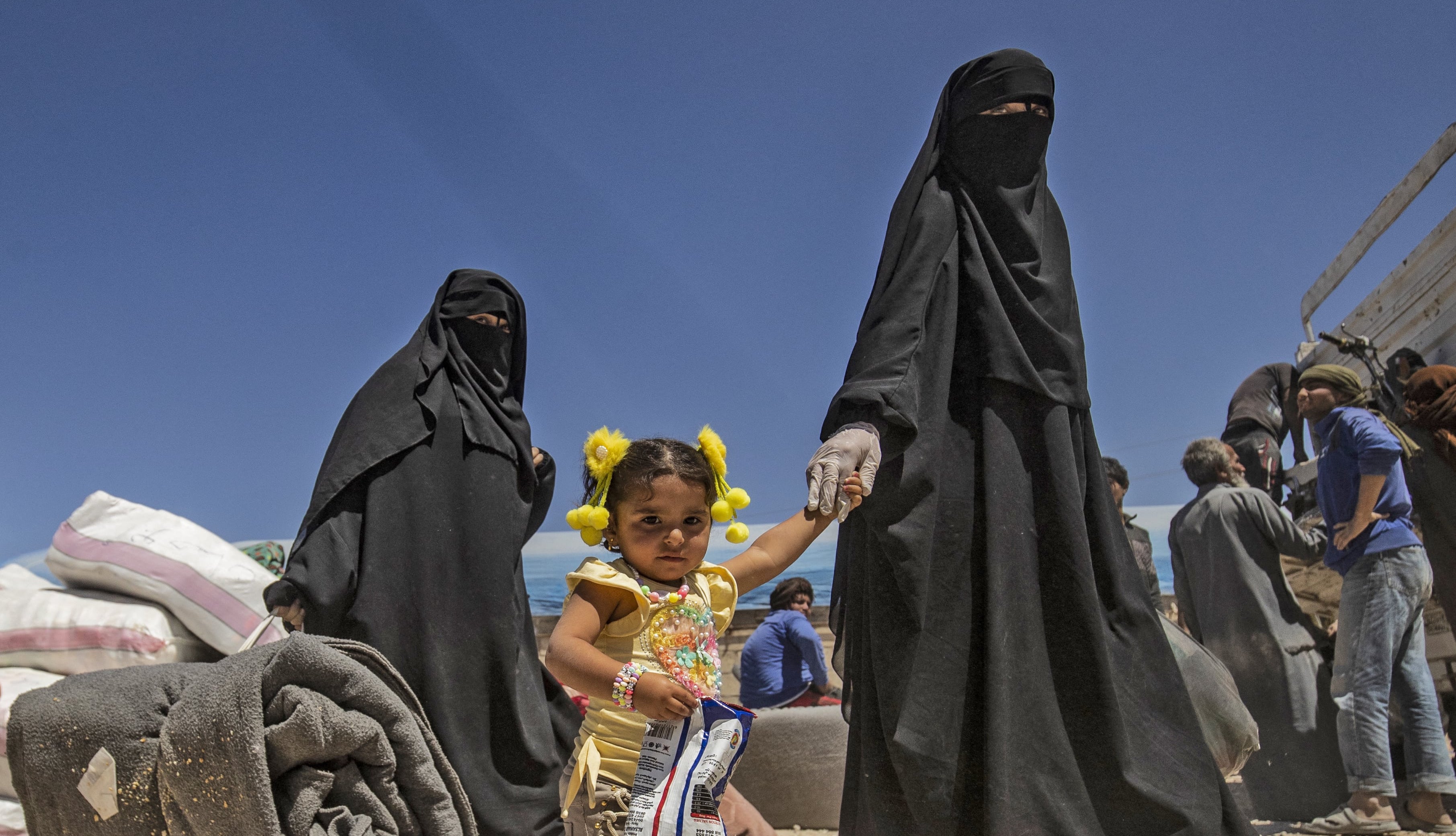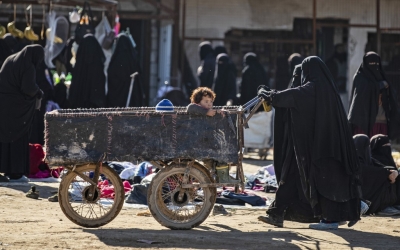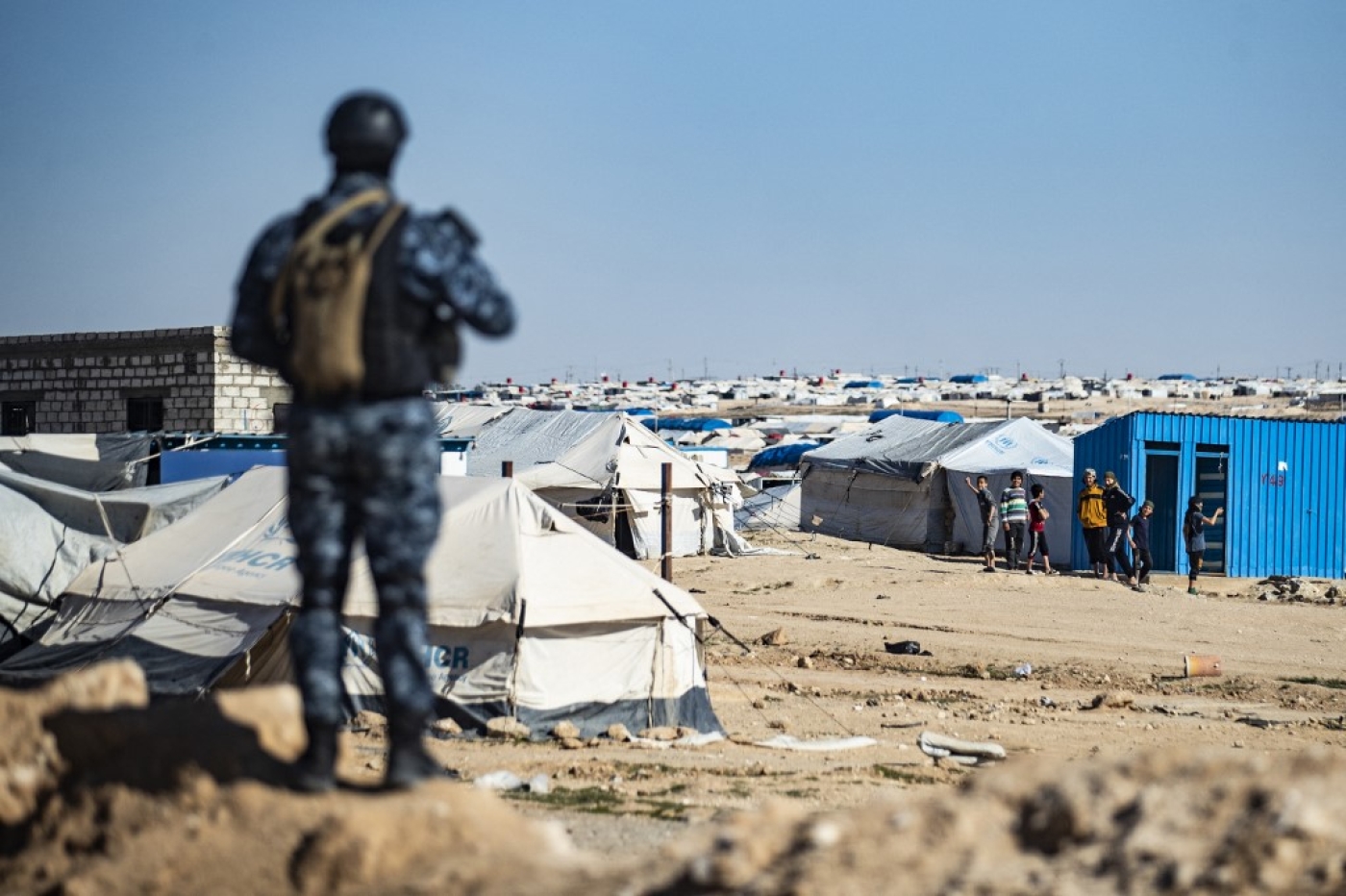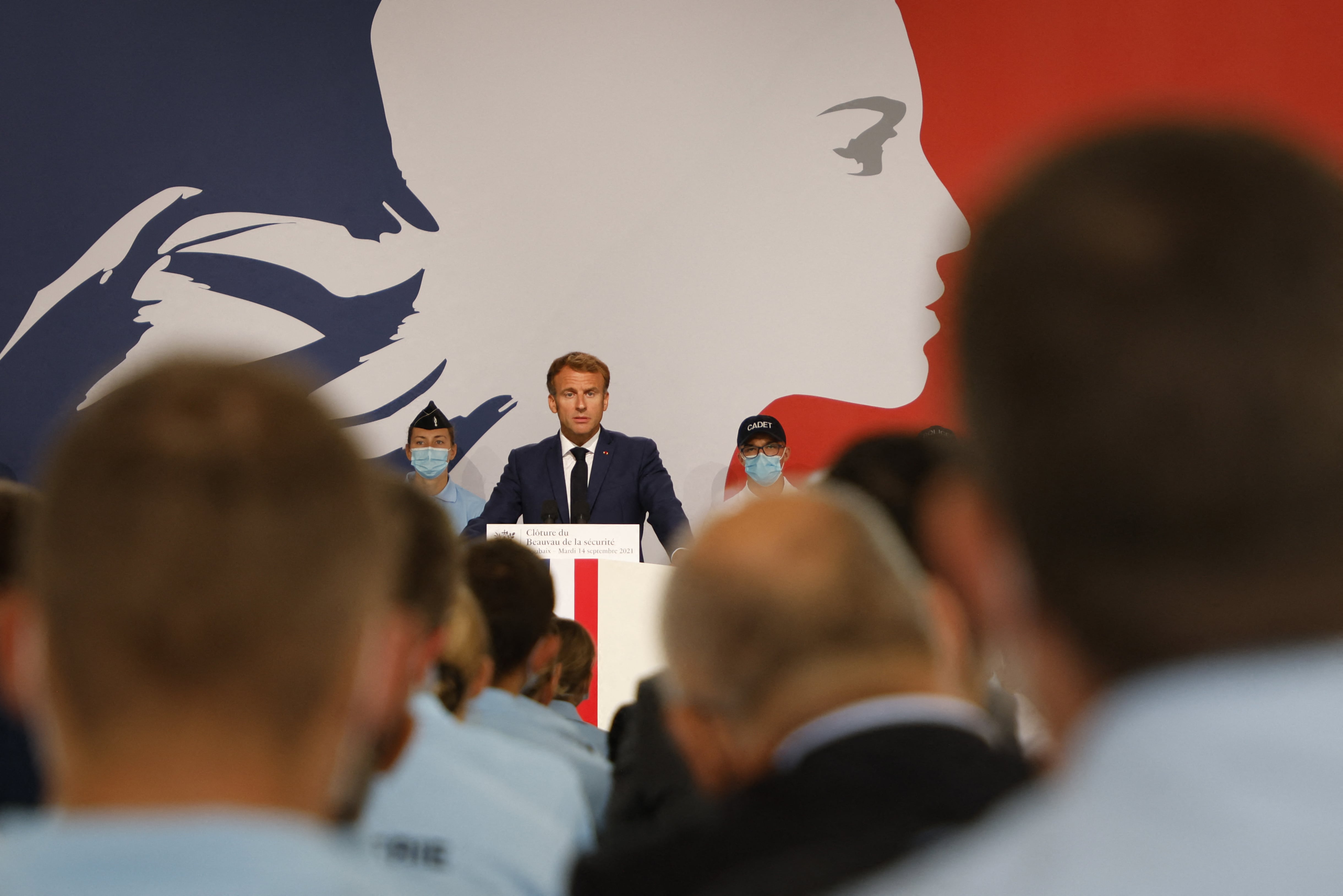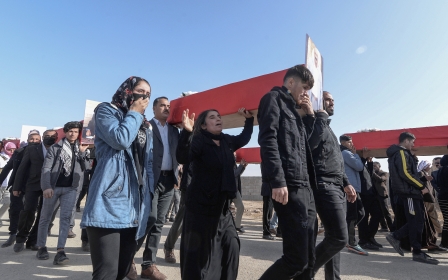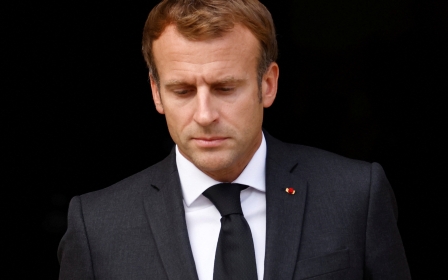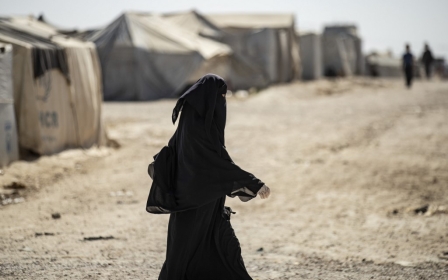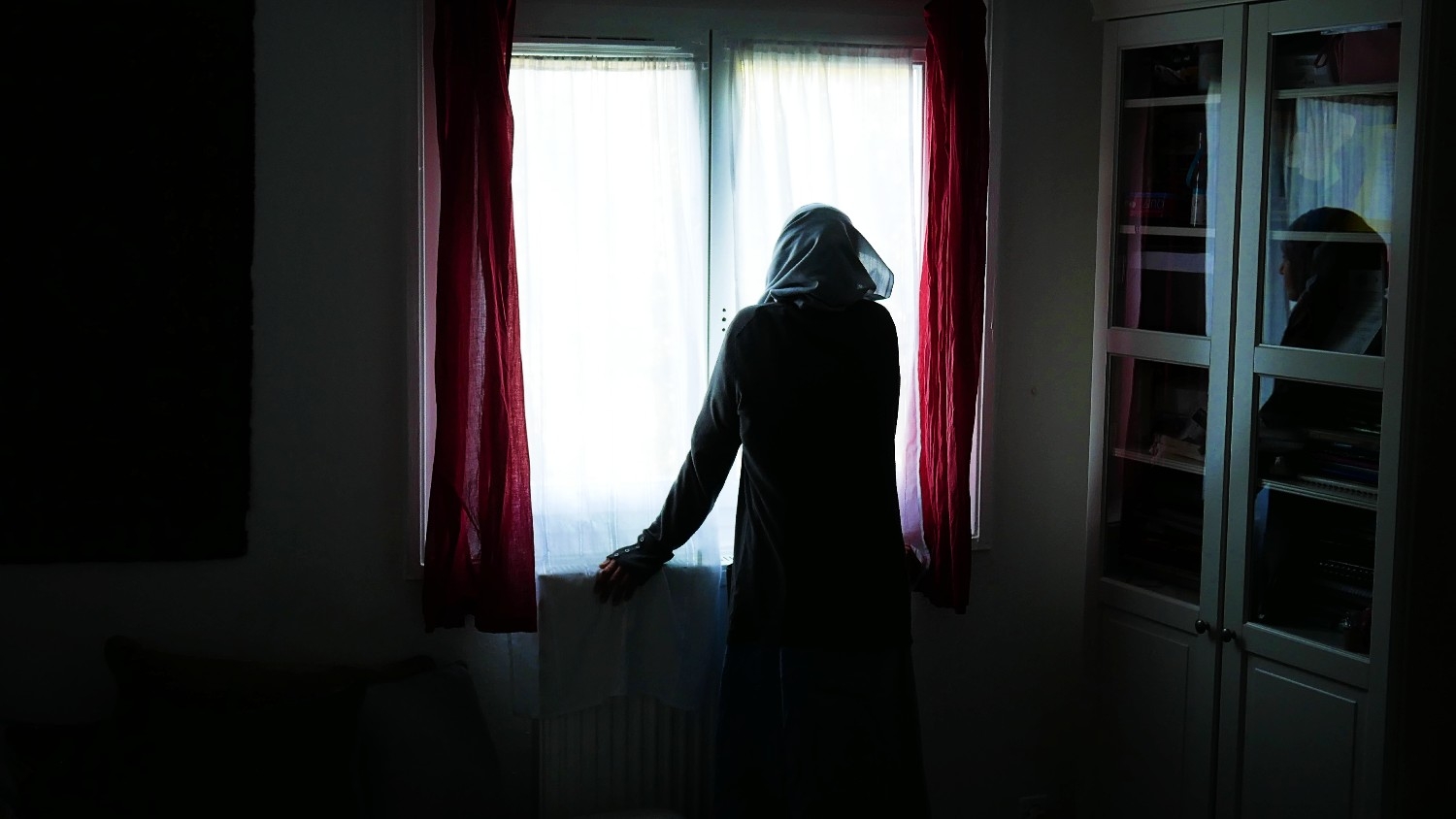
France has 300 women and children in IS camps. When will they go home?
Like many of the hundreds of French families whose children left to join the Islamic State (IS) group, Jean-Marc and Monique, retired farmers living in the mountains of Auvergne in central France, will never know why their daughter, Mathilde*, and her husband took their four young children to live in IS territory.
For a few years after the young family disappeared in 2013, they had sporadic phone contact: Christmas, an occasional birthday. Their daughter gave birth to a fifth child, they learnt, a boy.
But in mid-2018, the contact stopped.
“It was exhausting,” Jean-Marc told Middle East Eye at the kitchen table of the family’s old farmhouse. Monique developed breast cancer. (Her condition has since improved.)
Then, one day in October 2019, Jean-Marc received a message from their eldest granddaughter, 15-year-old Sara. She was in a camp for IS families in northeastern Syria.
New MEE newsletter: Jerusalem Dispatch
Sign up to get the latest insights and analysis on Israel-Palestine, alongside Turkey Unpacked and other MEE newsletters
"Dear grandma and grandad," she began, “did you hear that I was married, and that mummy and daddy and all my little brothers were killed?”
They hadn't.
In the long message, Sara explained that aged 13 she was married off to a 17-year-old Moroccan. Two years later, in the midst of a bloody battle for the militant group's last stronghold, Baghouz, in Syria, she and the family witnessed a soldier enter their apartment and kill their father, an IS fighter, at close range.
With her husband weeks later, Sara saw what she believes was a French plane drop a bomb on the block where her mother and siblings lived, killing them all.
“She had to identify the bodies,” Sara's grandmother Monique told MEE, breaking into tears. The eldest was 13. The youngest, the sixth child, was born just days before.
'Did you hear that I was married, and that mummy and daddy and all my little brothers were killed?'
- Sara, orphan detained in Roj camp
A month after that, 15-year-old Sara watched her husband die after being shot by a sniper as he went to get water. The following day - “the worst day of my life” - she was struck in the head by shrapnel, which she believes came from a French missile.
Sara had to eat hay to survive Baghouz, she wrote to her grandparents. “I watched children burning right in front of my eyes.”
For years, Sara and hundreds more French women and children have tried to survive in Kurdish detention camps for families of suspected IS fighters in conditions so bad they may amount to torture, according to the UN. They are given no news on when they might be allowed to return: the mothers to face prosecution, the children a long assessment by social services.
Last year, a group of women began a hunger strike in a desperate, unsuccessful attempt to force France to repatriate.
Back at home, desperate families push for their relatives' return. Given almost no news by suspicious authorities, they wait for scraps of information from the camps.
French police raid their homes at dawn and arrest them for sending relatives money, a lifeline in camps where non-existent medical services, meagre food rations and filthy water leave many detainees gravely ill.
France reluctant to repatriate
At its height in 2015, the IS "caliphate" covered an area roughly the size of Britain.
When Baghouz was taken in March 2019 by the Syrian Democratic Forces (SDF), an alliance of Kurdish and local Arab groups backed by a US-led coalition, tens of thousands of people streamed out of the flattened city.
Now, roughly 10,000 men and hundreds more adolescent boys are held across 14 overcrowded prisons in Syria's northeastern Hasakah region.
Women and children, including orphans like Sara, live in two sprawling camps, al-Roj and al-Hol, home to roughly 60,000 people: around 20,000 from Syria, 31,000 from Iraq, and up to 12,000 from other countries: 4,000 women and 8,000 children.
Kurdish authorities, who run the prisons and camps, have repeatedly urged countries to repatriate their nationals. So has the United Nations, the European parliament, countless rights groups and the United States, which has offered to fly people home.
But many governments are reluctant to repatriate citizens who may have had ties to the militant group.
Only around half of the roughly 60 countries with citizens in the camps, including the US, Russia and Kazakhstan, have brought some home - and often just a few at a time.
France, the western country with the most nationals left in the camps, has repatriated around 35 children. It still has an estimated 100 women and 200 children there, two-thirds of whom are under six.
Some families arrived as long ago as 2017.
Meanwhile, life in the camps is becoming increasingly dangerous, as IS assassins stalk the tents and sleeper cells mobilise once again.
Years of horror in camps
In Roj, where Sara and most of the French nationals live, detainees are allowed to send one short voice note home each week.
There, toxic fumes from nearby oil fields give detainees breathing problems. People die in tent fires. Children have no access to proper education.
Healthcare facilities are scarce and families live on rations of rice, lentils, oil, sugar and bulgur wheat. Only those with money can afford bottled water, fruit and vegetables.
“Everyone knows that if the families [in France] don't send money to the camps, the children die,” said Marie Dose, a lawyer for several families.
Some women and children have open, infected shrapnel and bullet wounds left over from the 2019 siege of Baghouz.
MEE has seen photos of a young girl with a finger-width hole in the roof of her mouth caused by a stray bullet.
Around 100km south of Roj is al-Hol, a larger camp first set up for Iraqis displaced during the 1991 Gulf War.
There, women give birth in tents, people queue for hours for worm-riddled water that perpetuates the camp’s acute diarrhoea epidemic, and an average of two children die each week, often from preventable conditions.
Families are at the mercy of the region's extreme weather conditions and nearby fighting. One mother said she heard the "ground shake" recently as Turkey bombed targets in the area.
“I can’t accept just being a spectator to their suffering, their slow death,” a 58-year-old Franco-Moroccan, whose daughter and grandchildren are in Roj, told MEE. “It’s incredibly difficult to live with this nightmare.”
Several of the French women say they have been beaten in Kurdish prisons, where they are sometimes detained for months before being moved between camps. Others say they are locked up for having a mobile phone.
MEE was told by one French woman that her daughter was beaten several times in prison, deprived of food and stripped naked in front of her children.
Another said her sister was currently looking after the two young children of a French woman imprisoned for protesting against her conditions.
Last year, a different French woman's 18-month-old son “nearly died” in a prison in Qamishli, on the Turkey-Syria border, after a cardiac arrest.
The guards didn’t come when the women in the crammed cell shouted, according to her account, but a cellmate resuscitated the boy.
When provided with these accounts, a spokesperson for the Kurdish authorities told MEE: "What is stated is incorrect. There is a systematic campaign to distort the facts." They gave no further details.
Islamic State resurgence
Despite some arrests, outnumbered guards in al-Hol have been unable to stop IS attacks and assassinations, including multiple beheadings.
The UN last year documented cases of "radicalisation" and training at the camp, warning that foreign children were being "groomed" as future IS operatives.
The father of a 29-year-old French woman recently transferred to Roj told MEE that the woman and her three young daughters barely left their tent in Hol. “She [was] petrified that Daesh would return,” he said, using a different acronym for IS.
Then, in late January, hundreds of IS fighters attacked a prison in nearby Hasakah to free captured comrades.
Hundreds of children of mixed nationalities were among the thousands living in appalling conditions at the Ghwayran jail. Some were reportedly used as “human shields” during the attack and are still being detained at the prison.
“Responsibility for anything that happens to these children also lies at the door of foreign governments, who have thought that they can simply abandon their child nationals in Syria," Save The Children said.
Last year, 10 French women in the camps starved themselves to pressure their government into repatriation.
So did a French mother whose daughter - living with her four children in Roj - is gravely ill needs urgent treatment.
“She tells me that she is getting worse, bleeding a lot, and getting weaker," the mother said last year. "She is like an animal in her tent, dying in front of her children.”
In December last year, a 28-year-old diabetic French woman died in Roj, leaving behind her six-year-old daughter, who is now being looked after by another French mother.
Dose, the lawyer, said authorities were informed multiple times about her worsening condition.
"What are we going to tell [the child] when she turns 15? How are we going to explain to her that for three years, France let her mother die there?"
The French justification
Families speaking to MEE said their loved ones accepted they would likely be imprisoned if repatriated and that their children might end up in care, if not with relatives.
Women suspected of being members of IS can be sentenced to 20 years in prison in France, which has some of the most extensive counter-terror legislation in Europe.
Some 250 or more French citizens once in IS territory have been repatriated under an agreement by which authorities in Turkish-controlled areas fly French nationals home if they come onto their territory or are handed over. These are "expulsions", the French stress, not repatriations.
Paris, which says it repatriates on a "case-by-case" basis, has argued that the women should be tried in Syria and Iraq. France has no jurisdiction over the territory, it argues, and the women and children would be a security risk at home.
Explained: The holes in France's policy
+ Show - HideMore than 60,000 women and children live in Kurdish-run camps in Syria's northeast for families of alleged Islamic State (IS) group fighters. Among them are 300 French nationals that Paris has refused to bring home.
Why?
France argues that it has no jurisdiction, control or authority over its citizens in northeastern Syria.
Lawyers for families disagree, given the women and children in question are French nationals and that the republic has already carried out several repatriation missions.
A UN special rapporteur has noted that these operations are helped by France's “close relations” with the SDF, which controls much of northeast Syria.
How does France reach its decisions?
France says it runs a "case-by-case" repatriation policy. This has resulted in France handpicking 35 citizens - all children, so far - to be brought home, but leaving gravely ill women and orphans like Sara in the camps.
The country's approach “cannot be justified", according to Council of Europe Commissioner for Human Rights Dunja Mijatovic.
"No one can claim that certain children are not at risk and are not going through this continuum of violence,” she said. “[The children] should not be forced to bear the consequences of their mothers’ choices.
“Repatriation is, in my opinion, the only way forward."
But what do the French authorities say to that?
France has argued that the men and women accused of joining IS should be tried where they allegedly perpetrated their crimes.
But the Kurdish administration doesn't have the resources or evidence to prosecute them, while France has expansive counter-terror laws which mean the women could be sentenced to two decades in prison.
What's the security situation?
Another argument France uses against repatriation is that returnees are a security risk.
In 2016, the Paris prosecutor described the children as “ticking time-bombs”, implying sooner or later they would plot an attack on French soil.
But numerous counter-terror experts, including a top French anti-terror judge and the UN’s counter-terror chief, have said it is a far greater security risk to leave families there.
Human Rights Watch has said that being “shunned by home countries” may make the children more vulnerable to IS recruitment.
By not repatriating them, the US military chief in the Middle East said last year, “we're giving ourselves the gift of fighters five to seven years down the road."
Is there any legal route the families can follow?
Two families with relatives in the camps took France to the European Court of Human Rights (ECHR) in September for not repatriating their loved ones.
The ECHR's decision on whether to condemn Paris's inaction, due between July and September, could force France other European countries to bring their nationals home, unless they choose to ignore it.
“The judgement is final and, in principle, executable immediately," a UN legal expert who has worked on these issues for more than a decade told MEE.
"But we know that many judgements are simply not really dealt with… [France] could simply decide not to.”
Things could come to a head as early as July when France faces a ruling at the European Court of Human Rights (ECHR) after a case brought against the republic by two families with relatives in the camps.
It will be the biggest test yet of France's position.
For Marc Lopez, a retired civil servant whose daughter-in-law and four young grandchildren have been in Roj for more than three years, the idea that France has no jurisdiction in the region is laughable.
Speaking in his airy Parisian apartment as dusk fell last September, Lopez described how he and his wife went to Roj in June 2019 with two other couples, from Austria and Sweden, to see their families.
Kurdish authorities approved a visit to the camp. On the day, the Austrian and Swedish couples entered, but after waiting for hours, Lopez and his wife were told to leave, and that the guards couldn’t pass on the toys, books, medicine and clothes they had brought for the children.
Lopez said: "We were told the orders came from above: ‘It's the French government, without the green light from Paris you won't see them'."
Through the fence, they spotted their two eldest grandchildren.
“When I said, ‘Come here so I can give you a kiss’, the eldest came and put his cheek to the fence,” said Lopez.
“We told them we were there for them, that we would do everything we could… Their eyes were so big. We managed to see them for two minutes, to give them a kiss, before the guards came. It was terrible.”
The French foreign affairs ministry didn't make anyone available to answer questions about its relationship with Kurdish authorities, the treatment of families or its repatriation policy.
France's "case-by-case" approach has so far meant returning orphans or children whose mothers agree to give them up.
In a voice note sent to her father from one of the camps, a tearful French mother explains how, given the awful choice to let her children go home on their own or keep them with her, she couldn’t bring herself to part with the youngest.
"I couldn't do it," she says, crying as she explains how her two eldest children were driven away. "I swear it's ripping apart my heart."
Another mother describes how, as she handed over her children, her young daughter screamed so much her mouth went blue.
“They closed the curtains in the car so they wouldn't see me,” she said, sobbing. “I couldn’t really say goodbye to them.”
The practice - also employed by Canada and the UK - of separating mother and child violates the Convention on the Rights of the Child, which states that family unity is in the child's best interests.
'They are French before being jihadists'
Families and advocates hope a possible ECHR condemnation will force France - and other European countries - to finally repatriate, setting a precedent.
Momentum appears to be building. In recent months, previously reticent countries like Belgium, Germany and Denmark have returned nationals.
And in France, a growing number of civil society figures, politicians and rights groups have called for repatriation.
But "the official French position has not budged an inch,” a UN legal expert who has worked on these issues for more than a decade told MEE, requesting anonymity as they were not authorised to speak to journalists.
Families fear that the French government, worried about a backlash, won’t act - if at all - before April's general election or legislative elections two months on.
Much of their apprehension stems from an incident in 2019, when French daily Liberation revealed what appeared to be a cancelled plan to repatriate up to 250 French citizens.
A document - later seen by MEE - listed mothers and children to be brought home, including relatives of people interviewed for this piece.
“They are French before being jihadists,” interior minister Christophe Castaner said in the weeks before the operation.
But after publication of an opinion poll, in which 89 percent of respondents said they were “worried” about the “return of French jihadis”, ministers backtracked and repatriation plans for fighters and their families appear to have been scrapped.
Lawyer Dose says she has spoken to members of Emmanuel Macron's cabinet about why France doesn't repatriate. “They don’t have any argument other than public opinion."
"I don't know when in French history we've left children in a war zone," she added. "It's one of the most shameful moments in contemporary French history."
“We’re sacrificing children for a political calculation,” said Lopez. “Go and see my grandson. Look him in the eye - tell him why you're leaving him there."
The cancelled repatriation plan is one of many examples of government negligence, according to the families, who say they are treated as suspects, not victims.
They described having to send physical letters to get any response, and being kept in the dark by authorities.
Giving evidence during the 2020 trial of French IS fighter Tyler Vilus, for example, a woman learnt that France knew her missing daughter had been killed by a bomb in Mosul, Iraq.
'I don't know when in French history we've left children in a war zone'
- Marie Dose, family lawyer
“Did the intelligence services not tell you?” said the official presiding over the trial, apparently puzzled as to why she had never been informed.
The family of the 28-year-old French woman who died in Roj in December still hasn't been officially informed of her death by authorities.
“The main interaction we have with the government is with the police,” said Lopez. “All the families have been questioned multiple times and virtually all the families have also had [dawn] police raids.”
In September 2020, several family members were arrested for sending money to relatives in Syria in a crackdown on “cyberfunding of terrorism”.
"The way families are treated is shameful,” said Dose.
Sabrina, a 40-year-old nurse whose younger sister and five-year-old nephew are in Roj, was one of those arrested.
In her quiet flat in the Paris suburbs, she described how armed police in balaclavas stormed in at 6am, handcuffing her and her husband in front of their two children.
They suspected the pair were part of a network financing terrorism, said Sabrina, and were sending money to help their family escape.
The officers left the place “a mess”, she added, “they emptied everything looking for money."
Blindfolded, the couple were led outside in front of neighbours and their children’s classmates on their way to school. Sabrina was in police custody for four days.
She knows people who have lost friends and jobs after speaking openly about family in the camps, so Sabrina doesn't speak about her sister and nephew to friends or work colleagues, and her children can't tell anyone at school.
“When you’re Muslim, there are more doubts hanging over you, for sure,” she said. “Things are getting tougher in France at the moment… it’s as if every Muslim is guilty.”
Last year, in a poll for Le Monde, 63 percent of respondents agreed that “Islam is a danger for France and the Republic.”
Once, whilst being questioned by the security services, an officer asked Sabrina: “‘Do you intend to leave [to join IS] as well?’” she recalled.
“I don’t think they would have asked that if I wasn’t Muslim.”
A police spokesperson told MEE to send requests for comment on police treatment of families to the foreign affairs ministry, which did not reply before publication.
Le Collectif
Sabrina, along with Lopez and several others, helps run Le Collectif des Familles Unies, the Collective of United Families, a group of roughly 130 families from across the country with relatives in the camps.
As well as petitioning the government to repatriate, the group is often a rare beam of support. “You feel less alone,” said Sabrina.
The collective has helped locate orphaned grandchildren and reestablish contact between families, but Sabrina and Lopez have also had to give bad news.
“Most of the time people start crying,” said Sabrina. “You don't know what to say.
“Sometimes you have to lie. For one girl, my sister told me she had been cut in half. I couldn't tell the family that.”
Some never find out what happened to their loved ones. Others have breakdowns, or divorces.
"The nights are the worst," said Lopez, "for the rest I keep busy working on getting the families home.”
Sixty-six-year-old Albert, a former telecoms engineer and trade unionist from Brittany, has been in touch with several women whose parents refuse to speak to them.
He’s “annoyed” with his 32-year-old daughter, Gaelle, for leaving and wants to understand why she did, but added: “I’m her father, not her judge.”
During MEE’s visit to his home, Albert played part of a video shot by a French journalist who had tracked down his daughter in Roj.
“Give grandad a kiss,” Gaelle said to the little blonde boy toddling around, as she’s interviewed between tents.
Albert and his wife cried the first time they watched it. They hadn't seen her for six years.
Their grandson was born during the siege of Baghouz, when for months they thought Gaelle was dead. “I've never seen him, never given him a hug," Albert said.
"Either I'm a real idiot, I mean completely stupid, and I don't understand anything anymore, or these people are making decisions that are unjust."
‘What’s happening in France?’
Back in the mountains of Auvergne, hundreds of kilometres southeast, Monique brought down a photo collage of her and Jean-Marc's daughter and grandchildren. Smiling out from a childhood photo bottom-right is Sara. The others are all now dead.
“I can’t look at it,” said Jean-Marc. Monique turns it to face the wall if he walks into what was once their daughter’s bedroom, where it stands on a shelf leaning against the wall.
For more than three years, Sara has been living on her own, in squalid, dangerous conditions.
Having left France aged 10, she turned 18 last August. The family and their lawyer have repeatedly written to French authorities about Sara’s plight, but they refuse to bring her home.
Before he was taken to Syria, Jean-Marc taught his grandson Mustafa to look after horses and tend to the garden.
He later learnt that as a teenager Mustafa earnt money in Raqqa, Syria, gardening for people in the city.
Jean-Marc remembers his son-in-law calling and asking him to speak to Mustafa, who missed his grandad.
“That was the last time I spoke to him on the phone,” he said, his eyes wet for a moment.
In her handbag, Monique - who has nightmares about IS fighters coming to kill the family - still carries a printed copy of the message they received from Sara in late 2019. It is creased into familiar folds.
“You can hear shots and bombs nearby,” Sara, who wants to be a midwife, wrote from al-Hol. “I don’t want to live in a war where there is only the material of a tent to protect you.
“Anyway, what’s happening in France? What do they say about us in the news?”
Main photo: Sabrina, whose sister and nephew are in a Kurdish-run camp, says she has been treated differently by French police because of her faith (MEE/Frank Andrews)
* Some interviewees and family members included in this story have been given pseudonyms to protect their identities.
This article is available in French on Middle East Eye French edition.
Middle East Eye delivers independent and unrivalled coverage and analysis of the Middle East, North Africa and beyond. To learn more about republishing this content and the associated fees, please fill out this form. More about MEE can be found here.


